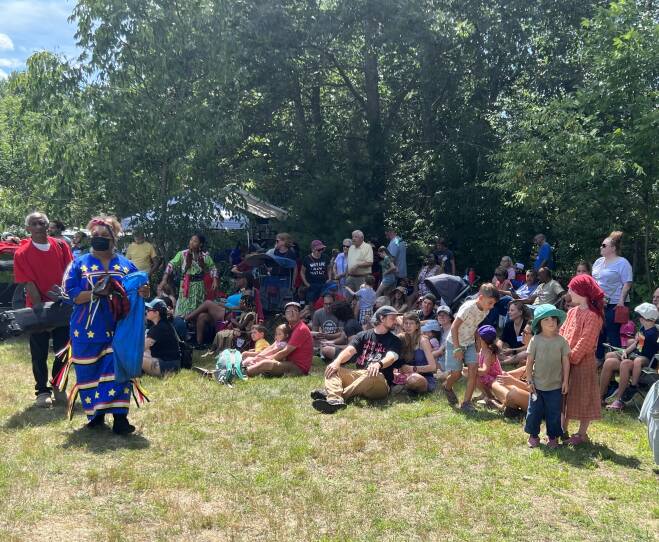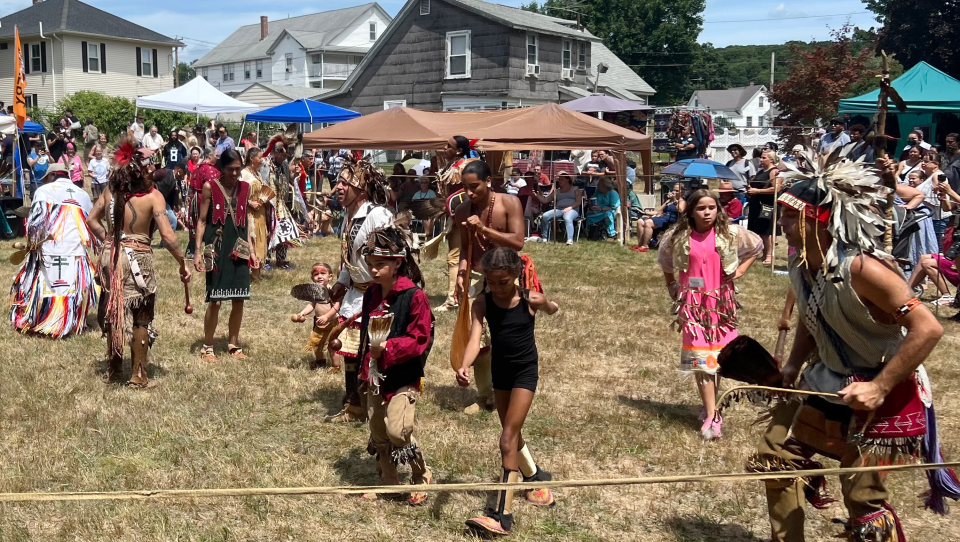Since 2020, the COVID-19 pandemic has prevented many Native people of Central Massachusetts from gathering and fully practicing their customs.
So on Sunday, when the Nipmuc people held their first pow wow since the start of the pandemic, thousands showed up to dance, sing and celebrate their culture. Braving the heat, many wore traditional attire like buckskin chaps and breastplates made of animal bones.
They reveled that the event allowed them to once again come together as a state-recognized tribe on land in Worcester County they claim as ancestral. Some attendees said this pow wow was especially important considering recent hardships, including deaths from COVID-19 and conflict with the city of Worcester.
Many of the Nipmuc people attended from across Massachusetts. Others flew in from places as far as Oregon.
“It’s just kind of rare that you can have a lot of Indigenous people — at least around here in one place — just be able to express themselves,” said Meghan Carron, who drove out from Medford.

Pow wows are common among Native American tribes across the United States during the summer. Other New England Indigenous groups, such as the Mashpee Wampanoag, have already held their gatherings. Although pow wows usually involve singing and dancing, tribes often put their own unique spins on the celebrations.
The Nipmuc pow wow Sunday took place in South Grafton in a grassy yard behind the office of the Nipmuc Nation Tribal Council. The pow wow featured drummers who sang traditional songs as dancers of all ages performed in a roped off circle that people sat around.
Al Godfrey, who’s been performing at pow wows for decades, said dancing allows him to connect with his Native ancestors. He compared the movement to meditating.
“It’s something that you feel inside, and it’s something you can’t talk about,” he said. “It’s like a spiritual awakening.”
During the pow wow, Nipmuc leaders officially introduced a new member, a 2-year-old boy called Little Bear. His parents brought him into the circle where he walked around smiling — and then didn’t want to leave.
“That was his first time actually being in the circle,” said his mom, Naomi, who goes by the name Dancing Feather. “He just took it like his ancestors were walking him through it. His grandfather was there with him. It was just a powerful moment.”

Other than the tradition, inclusion was a big theme of the pow wow. Members of other New England tribes — including the Narragansett and Wampanoag — attended the Nipmuc celebration. There were also people with no Indigenous heritage.
Liam Pelosky of Westford showed up after a friend invited him. He had never been to a pow wow and didn’t know what to expect before he arrived. Once he walked in, he said he quickly saw how much the culture means to many Nipmuc people.
“[It’s] powerful. Like you can feel it,” he said. “They’re very proud, and they should be. It’s all beautiful stuff."

Amid the singing and dancing, some attendees reflected on the challenges the Nipmuc people have gone through lately. The tribe has lost members to COVID-19. People also remain upset about a land acknowledgement plaque the city of Worcester recently unveiled outside City Hall to commemorate the Nipmucs, who've lived in Central Massachusetts since before the state was a colony.
The plaque went up as part of Worcester’s celebration of its 300-year anniversary this year. Part of the plaque reads, “We acknowledge the painful history of dispossession and marginalization that stripped Nipmuc Peoples of their right to self-determination and of relationship to land and territory.”
Love Richardson, the spokesperson for the Nipmuc Nation Tribal Council, said that language is factually inaccurate because the Nipmuc people were not stripped of their land when the English arrived. She added that the plaque is racist because it lumps the history of Nipmuc people with that of other Native Americans who were forcefully removed from their lands by the U.S. government.
“I’m just tired of the narrative being that we’re either savages or that we’re so poor,” Richardson said. “[It's] like ‘woe is me.”’

Thomas Doughton, a senior lecturer at the Center for Interdisciplinary Studies at Holy Cross, added that it was inappropriate for the plaque to say “Nipmuc Peoples.” Capitalizing “peoples,” he said, conveys that Nipmucs have always been one part of a large, formal tribe. In fact, Nipmuc Native Americans have existed as various bands of Indigenous people and there’s no proof they’ve always been organized into a singular group, he said.
“There is … not, to my knowledge, a single document in the entire archive of New England colonial history produced by people identifying themselves as a Nipmuc tribe,” Doughton said.
In a statement, a city spokesperson said Worcester “remains committed to collaborating with community leaders on ways to educate the public about indigenous peoples, past and present.”
“As always, our Office of Human Rights welcomes feedback about how to best represent the communities that make up our diverse city,” the statement added.
Richardson and Doughton said there should be only one response moving forward.
“It needs to be rewritten, and it needs to be the voice of the Nipmuc people,” Richardson said.
The pow wow Sunday began to slow down in the afternoon as attendees headed home. Some of them said they were already looking forward to the one next year, which will be the 100th annual celebration.
“We’ve already started talking about [next year’s pow wow],” Richardson said.








